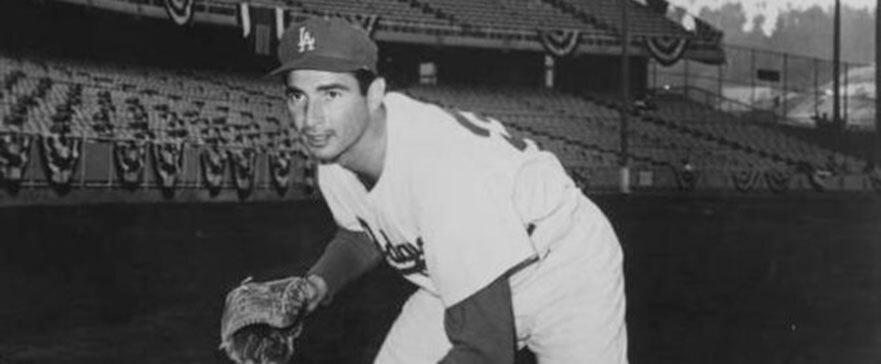Sandy Koufax is one of the greatest pitchers in the history of baseball. Born into a Jewish family in Brooklyn, New York, Sandy began his Hall of Fame career for his hometown Brooklyn Dodgers as a fresh-faced 19-year-old in 1955. Ten years later he was in the midst of perhaps the greatest stretch of dominance any Major League pitcher had ever enjoyed. With three World Series titles to his name already, the universally recognized greatest pitcher at that time was at the top of his game, ready to pitch his team to another championship win in game 1 of the 1965 World Series.
Except he didn’t—not because he didn’t pitch well enough or long enough, but because he didn’t pitch at all. He wasn’t injured or sick. He had no issues with his team. So why did he refuse to pitch in what might have been the biggest game of his life?
Bigger Than Baseball
Game 1 was scheduled for October 6. If you know anything about Jewish culture, you’ll recognize that as a busy time of year on the Hebrew calendar. Sure enough, in 1965, October 6 marked Yom Kippur, the Day of Atonement, the most sacred day of the year for the Jewish people. God established this day to “be a holy convocation for you; you shall afflict your souls, and offer an offering made by fire to the Lᴏʀᴅ. And you shall do no work on that same day, for it is the Day of Atonement, to make atonement for you before the Lᴏʀᴅ your God” (Leviticus 23:27–28).
Jewish people strive to obey this command on Yom Kippur. They trade in a regular work day for a day of prayer to the Lord, seeking forgiveness for their sins, in addition to fasting and acts of charity. But Major League Baseball isn’t an ordinary job. Even in the ‘60s, players were paid relatively elite salaries and received national recognition, perhaps none more than Koufax. It would be hard to imagine such a superstar would skip a World Series game for religious reasons.
A Championship at Risk
But skip it he did. And his team suffered without him. His replacement, Don Drysdale, an all-time great pitcher in his own right, was hammered by the Minnesota Twins’ offense. They racked up seven runs against him in less than three innings, cruising to a blowout win. Drysdale’s performance led him to quip to his manager, “I bet right now you wish I was Jewish, too.”
“I bet right now you wish I was Jewish, too.”
Koufax’s decision began to loom large. He was already known as a phenomenal performer on the big stage, and he was enjoying the best year of his impressive career. Surely he would have shut down the Twins and taken the series advantage! He did indeed pitch impressively the very next day in an effort that should have produced a win. But the Dodgers scored only one run and found themselves stuck with an ugly 2–0 deficit in a best-of-seven series.
The pressure mounted. But Koufax was undeterred. He went back out to the mound twice more and pitched two of the best games in World Series history, winning both by pitching complete-game shutouts, the second of which earned the Dodgers the championship in a decisive 2–0 game 7 victory.
Taking Your Faith Seriously
One of the most interesting aspects of Koufax’s decision was his motivation. He was a secular Jew, not strictly holding to religious Jewish customs. Yet he felt compelled to refuse to pitch that day. His decision caused those with a similar background to feel they could embrace Jewish culture and American culture simultaneously. It also signaled that Yom Kippur was not for the Orthodox alone but for all the Jewish people.
But his reverence for Yom Kippur might provide spiritual motivation for us as well. If Koufax, Jewish by heritage but not by religious practice, was willing to give up a chance for glory on the world’s biggest stage, how much more should we who love God be willing to give up our comfort for Him?
If Koufax, Jewish by heritage but not by religious practice, was willing to give up a chance for glory on the world’s biggest stage, how much more should we who love God be willing to give up our comfort for Him?
The world offers a lifetime worth of distractions, and we all feel their pull. It’s difficult to be in the world but not of it. Jesus told His disciples, “Whoever desires to come after Me, let him deny himself, and take up his cross, and follow Me” (Mark 8:34). We might desire to come after Him and follow Him, but we might not be so good at denying ourselves and taking up our cross.
We need to discipline ourselves to choose to love the Lord in word, thought, and deed in a sacrificial way. God should be worth more to us than anything we consider valuable on Earth, for nothing is greater than Him. If we have to miss a special event to go to church, or if we have to refuse things the world takes pleasure in to remain faithful to Him, we should consider it our joy. It’s just as the apostle Paul said: “But what things were gain to me, these I have counted loss for Christ” (Philippians 3:7).
This Yom Kippur, keep Koufax’s remembrance in mind as you consider how seriously you treat your own relationship with the Lord. It might just revolutionize how you walk with Him!
(Photo Credit: Unknown author, CC BY 3.0 (https://creativecommons.org/licenses/by/3.0), via Wikimedia Commons)




